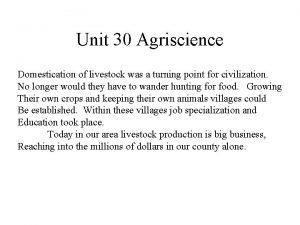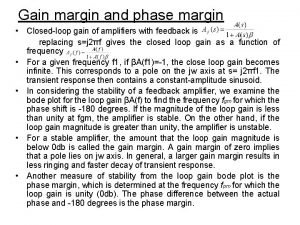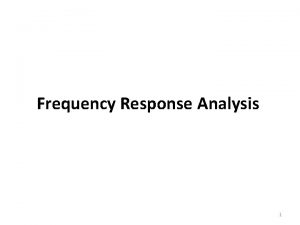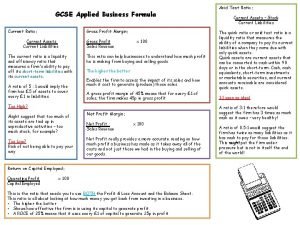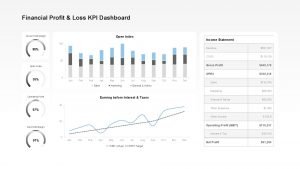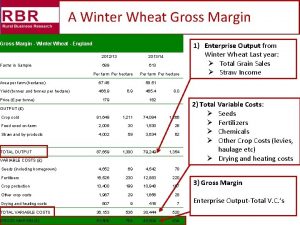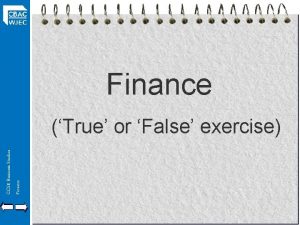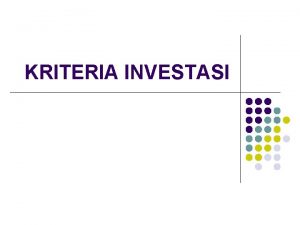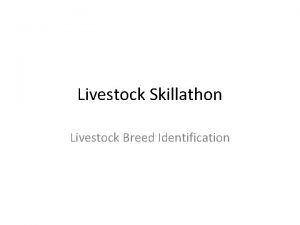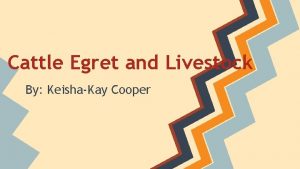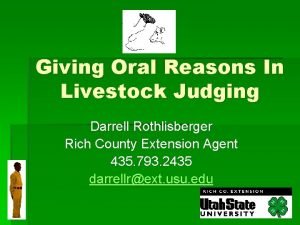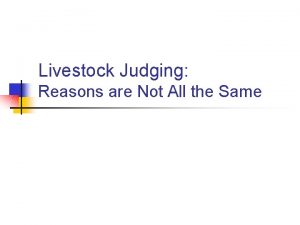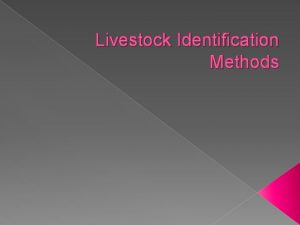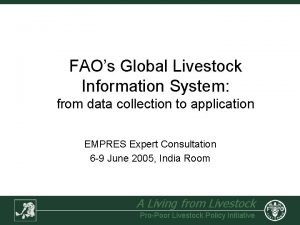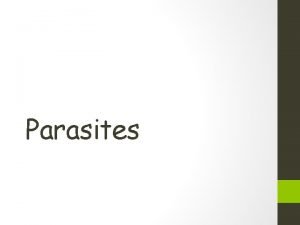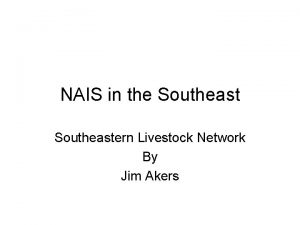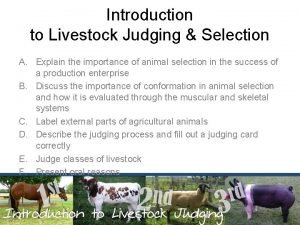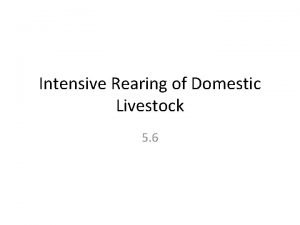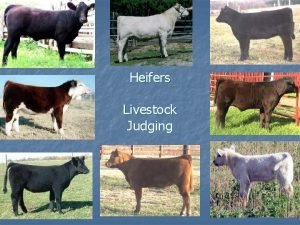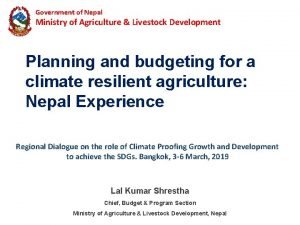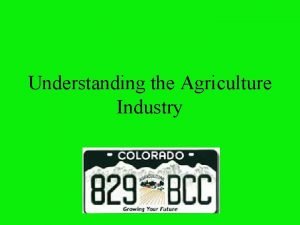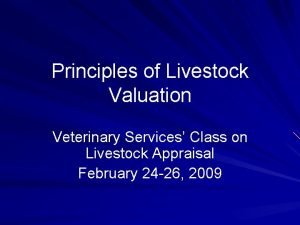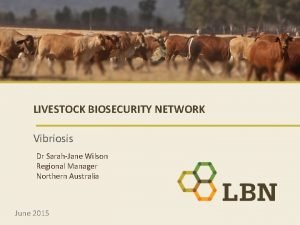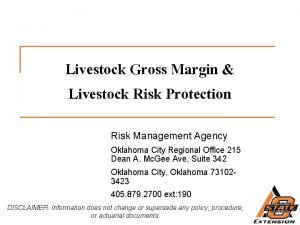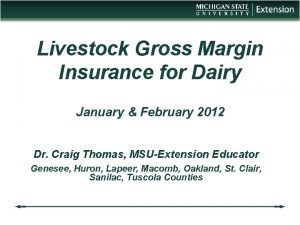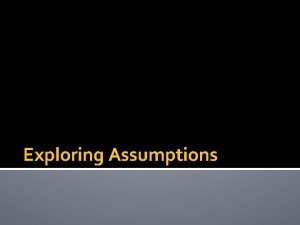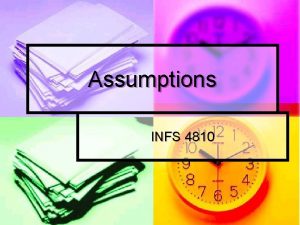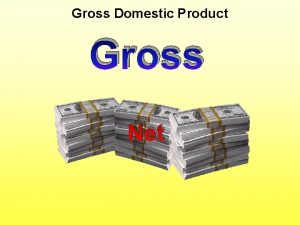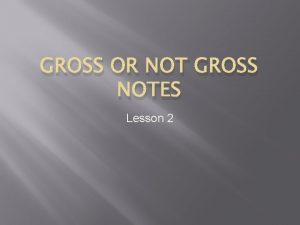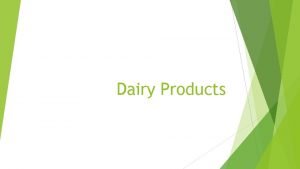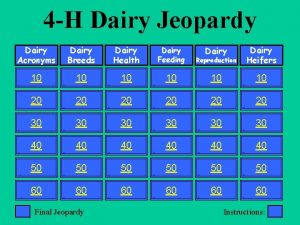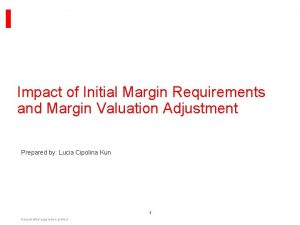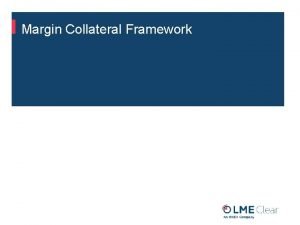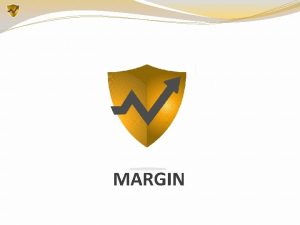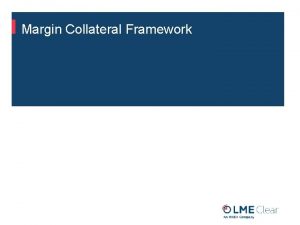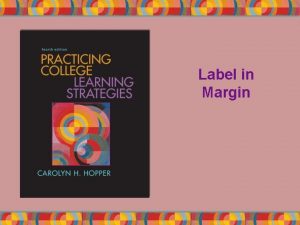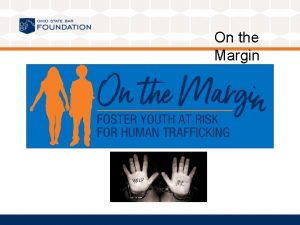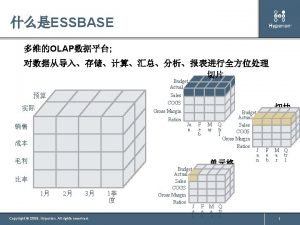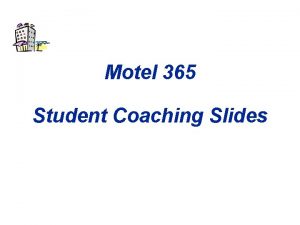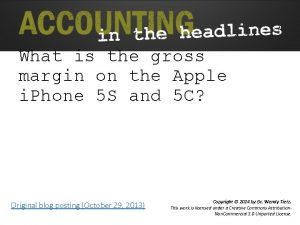Livestock Gross Margin Dairy An Assessment of Assumptions

























- Slides: 25

Livestock Gross Margin – Dairy An Assessment of Assumptions and Performance Presented by Cameron Thraen Agricultural, Environmental & Development Economics The Ohio State University 19 th Annual National Workshop for Dairy Economists and Policy Analysts Salt Lake City, Utah 2012

LGM-Dairy Research Team • Dr. Marin Bozic –Applied Economics, University of Minnesota. • http: //marinbozic. info/ • Mr. John C. Newton and Dr. Cameron Thraen –Agricultural, Environmental & Development Economics, The Ohio State University. • http: //aede. ag. ohio-state. edu/programs/Ohio. Dairy/ • Dr. Brian W. Gould – Agricultural and Applied Economics, University of Wisconsin • http: //future. aae. wisc. edu/index. html 2

Background • Research paper “Examining Distributional Assumptions of Livestock Gross Margin for Dairy Cattle. ” NCCC-134 Applied Commodity Price Analysis, Forecasting, and Market Risk Management Conference, St. Louis, MO April 1617, 2012. • Paper will be published on the University of Illinois Farm. Doc website (available early June): http: //www. farmdoc. illinois. edu/nccc 134/paperarchive. html 3

Summary of Key Features • Basket Option (Asian style) • A custom PUT option on gross margin (net price x quantity) • Strike is the expected contract total (gross) margin • Uses futures average prices (through time) • Portfolio (milk, corn, soybean meal prices) • Market-based tool • Based on futures and options prices • Price forecast and price volatility (implied) • Actuarially fair (conditional on assumptions) • Revenue smoothing & safety-net policy tool • Reinsured by RMA, includes subsidized premium • Catastrophic Risk Insurance

LGM-Dairy Rating Method Assumptions Ø Information from futures and options prices can be used to fit the moments of the milk and feed price distributions, Ø Terminal prices are distributed log-normally, Ø Rank correlations are used to preserve price dependency, • Data post 2005 does not inform the price relationships, Ø Milk-feed price correlations are zero. We have investigated each of these assumptions to determine the impact on the structural performance of LGM-Dairy product.

LGM-Dairy Rating Method Assumptions How do these fair? Ø Lognormality: a reasonable assumption § Relax this assumption using the Generalized Lambda Lognormal distribution and the Generalized Lambda Flexible distribution with high-frequency futures and options data • • GLD-Lognormal uses marginal GLD distributions but fixed moments to match lognormal GLD-Flexible uses marginal GLD with flexible higher moments estimated with high-frequency data § Volatility Skew is not reflected in the current RMA ratings method. • Only at-the-money puts and calls are used to estimate variance of the terminal prices. • The rating methods should reflect higher volatilities for price spikes as shown in this example for corn.

LGM-Dairy Rating Method Assumptions How do these fair? Ø Log - normality: a reasonable assumption § Relax this assumption using the Generalized Lambda Lognormal and GDL Flexible distributions Ø Milk-feed price correlation is zero: § For the 1998 -2005 time period, this was a reasonable assumption, but not after 2005, § Milk-feed price rank correlation is decidedly non-zero, and exhibits larger correlations when post 2005 data is incorporated. ü Rank correlations: are not suitable to capture the dependency between milk and feed prices. ü Non-elliptical, non-linear, tail dependence present ü Requires the representation of a more complex dependence structure and methods to capture this structure.

Milk and feed futures price deviates do not exhibit zero correlation. Corn Milk Spearman’s st nd rd th th 1 2 3 4 5 rank correlation nearby nearby 1998 -2011 1 st nearby 0. 07 2 nd nearby 0. 13 0. 11 0. 05 0. 06 0. 08 0. 21 0. 17 3 rd nearby 0. 14 0. 23 0. 28 0. 24 8 th nearby 0. 11 9 th nearby 0. 10 0. 22 0. 26 0. 32 0. 35 0. 23 0. 32 0. 34 0. 40 10 th nearby 0. 14 0. 21 0. 35 0. 37 0. 45

LGM-Dairy Rating Method Assumptions How do these fair? Ø Log - normality: a reasonable assumption § Relax this assumption using the Generalized Lambda Lognormal and GDL Flexible distributions Ø Milk-feed correlation is zero: This is not a reasonable assumption. § Milk-feed price correlation is decidedly non-zero, and exhibits larger correlations when post 2005 data is incorporated. Ø Rank correlations: do not adequately reflect the dependency between milk and feed prices, § Non-elliptical, non-linear, tail dependence present § Requires the representation of a more complex dependence structure and methods to capture this structure. § Use Rank Correlation and Empirical Copula

Corn, 5 th Nearby Milk-Corn prices exhibit ‘tail dependence’: a nonlinear, non-elliptical dependent structure 1, 00 0, 80 0, 60 0, 40 0, 20 0, 1 0, 2 0, 3 0, 4 0, 5 0, 6 0, 7 0, 8 0, 9 1, 0 0 0 Class III Milk, 10 th nearby • Extremal dependence present in both tails, asymmetric, and almost no dependence “in the middle” • Requires an empirical or data-based rating method

Effect of non-linear dependence on LGM premiums Deductible Official RMA Method Minimum Feed $0. 00 $1. 10 Maximum Feed $0. 00 $1. 10 $14, 569 $7, 380 $20, 350 $13, 308 Rank Correlations $14, 998 $7, 719 $16, 439 $9, 504 Empirical Copula $15, 286 $8, 219 $15, 478 $8, 246 LGM Contract: Insuring 16, 000 hundredweights, spread equally over all 10 insurable months / Average over all 2011 contracts § Increase (3% to 11%) LGM premiums to producers using the insurance product as a Class III PUT (minimum feed) § Significantly reduce (19% to 38%) the premium to producers incorporating the feed CALL side of the LGM contract.

Ø Comparison of net indemnity and premiums by rating method: RMA, Rank, Data Based, Bundled Option. Ø Comparison of net revenue generated by three LGM contracts Contract 1: ‘up-front’: months 1, 2, 3 insured Contract 2: ‘middle’: months 4, 5, 6 insured Contract 3: ‘looking ahead’: months 8, 9, 10 insured Contract Size 24, 000 cwt. Payout and premium at $1. 10 deductible Premium subsidy at 50% Time period 2005 - 2011

Jun Jul Aug Sep Oct Nov Dec No Coverage May Purchase at End of Month Apr Feb Mar Jan 1 2 3 4 5 6 7 8 9 10 Insurance Contract Period ‘Up Front’ LGM contract 24, 000 cwt per contract, $1. 10 deductible, no-subsidy 16

Net Margin with LGM contract: ‘Up Front’ 2005 - 2011 24, 000 cwt per contract, $1. 10 deductible, 50% subsidy.

‘Middle’ LGM contract 24, 000 cwt per contract, $1. 10 deductible, no-subsidy 1 2 3 4 5 6 7 Insurance Contract Period 8 9 Dec Nov Oct Sep Aug Jul Jun No Coverage May Purchase at End of Month Apr Feb Mar Jan 10

Net Margin with LGM contract: ‘Middle’ 2005 - 2011 24, 000 cwt per contract, $1. 10 deductible, 50% subsidy.

‘Looking Ahead’ LGM contract 24, 000 cwt per contract, $1. 10 deductible, no-subsidy May Jun Jul Aug Sep Oct Nov Dec No Coverage Apr Purchase at End of Month Feb Mar Jan 1 2 3 4 5 6 7 8 9 10 Insurance Contract Period

Net Margin with LGM contract: ‘Looking Ahead’ 2005 - 2011 24, 000 cwt per contract, $1. 10 deductible, 50% subsidy.

October 2008 – December 2009 Realized Margin– Without LGM • 2005 -2011 – Average = $145, 000 / Standard Deviation = $70, 728 / 1 sd below mean = $74, 320 22

LGM ‘Up Front’ 10/2008 – 12/2009 Average Value 10/08 – 12/09 Margin without a hedge $73, 518 Margin plus LGM net payout $85, 137 23

LGM ‘Middle’ 10/2008 – 12/2009 Average Value 10/08 – 12/09 Margin without a hedge $73, 518 Margin plus LGM net payout $97, 175 24

LGM ‘Looking Ahead’ 10/2008 – 12/2009 Average Value 10/08 – 12/09 Margin without a hedge $73, 518 Margin plus LGM net payout $100, 969 25

Benefit from LGM coverage • Over this 10/2008 to 12/2009 period, what is the calculated benefit from using these three LGM contracts? LGM can provide a safety net providing added margin when uncovered margins decline to financially ruinous levels. Looking ahead strategy appears to be preferred to a wait and act or up front approach. 26

Conclusions q In contrast to other portfolio situations where tail dependence increases portfolio risk, (magnifies losses) for gross margin insurance products extremal dependence can actually decrease portfolio risk. q With appropriate adjustments to rating methods, and employment of smart insurance policy strategy, LGM can serve as actuarially fair and effective financial disaster insurance tool. q Use of LGM requires a careful consideration of the firm’s financial structure and risk management goals. q Critical further research is needed on tail dependence between milk and feed markets, relaxing assumptions on marginal distributions and optimizing maximum length of contract. Additional research is needed on the impact of volatility measures and the term structure of premiums.

Livestock Gross Margin – Dairy An Assessment of Assumptions and Performance 19 th Annual National Workshop for Dairy Economists and Policy Analysts Salt Lake City, Utah 2012 Contact: Dr. Marin Bozic mbozic@umn. edu (612) 624 -4746 Department of Applied Economics University of Minnesota. Twin Cities 317 c Ruttan Hall 1994 Buford Avenue St Paul, MN 55108 Contact: Dr. Cameron Thraen John Newton Thraen. 1@osu. edu (614) 292 -2702 AEDE The Ohio State University 315 Ag. Admin. Building 2120 Fyffe Road Columbus, Ohio 43210 Contact: Dr. Brian Gould bwgould@uwisc. edu (608) 263 -3212 Department of Agriculture & Applied Economics University of Wisconsin. Madison 421 Taylor Hall 427 Lorch Street Madison, WI 53706
 Livestock breed identification: swine - vocabulary
Livestock breed identification: swine - vocabulary Phase margin
Phase margin Corner frequency
Corner frequency Net profit margin formula gcse
Net profit margin formula gcse Kpi profit margin
Kpi profit margin Wheat gross margin
Wheat gross margin Finance gcse
Finance gcse Tabel diskon faktor
Tabel diskon faktor Livestock breed identification swine - assessment
Livestock breed identification swine - assessment Cattle egret and cattle symbiotic relationship
Cattle egret and cattle symbiotic relationship Livestock judging transition terms
Livestock judging transition terms Livestock judging powerpoints
Livestock judging powerpoints Livestock risk management brokers near me
Livestock risk management brokers near me Animal kingdom taxonomy chart
Animal kingdom taxonomy chart Livestock identification methods
Livestock identification methods Livestock information system
Livestock information system Parasites of livestock - vocabulary
Parasites of livestock - vocabulary Livestock network
Livestock network Livestock judging card
Livestock judging card Domestic livestock
Domestic livestock Livestock judging basics
Livestock judging basics Ministry of agriculture and livestock development nepal
Ministry of agriculture and livestock development nepal Colorado agriculture facts
Colorado agriculture facts Livestock valuation methods
Livestock valuation methods Livestock biosecurity network
Livestock biosecurity network Livestock judging 101
Livestock judging 101
